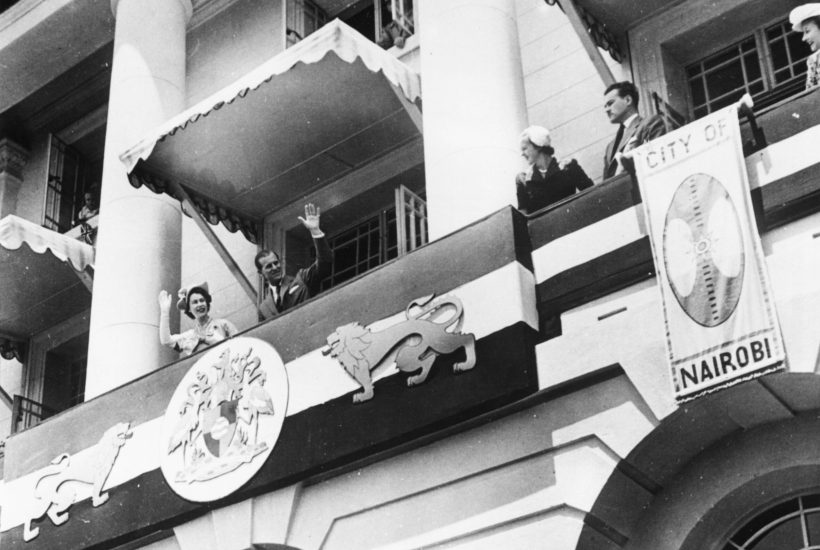As the Union Jack was run down the flagpole at Kenya’s independence in December 1963, Prince Philip said to Jomo Kenyatta, ‘Are you sure about this? It’s not too late to change your mind.’ Our founding president let that gaffe pass, which was quite amazing only a few years after the British suppression of the Mau Mau insurgency, in which Kenyatta had himself been interned. To the astonishment of local Britons spooked by the recent treatment of Belgians evacuating the Congo, rather than exacting revenge Kenyatta offered reconciliation, urging families like my own to stay. ‘There is no society of angels, black, brown or white,’ he told an audience of European farmers: ‘Let us join hands and work for the benefit of Kenya.’
It’s in light of that history, marked by both the bitter legacy of violent decolonisation but also Kenyan kindness, that the country has received the news of the Queen’s death. For Britain, Kenya has always been a special place. On 5th February, 1952, Princess Elizabeth and Philip were on safari in Kenya’s Aberdare highlands when she came face-to-face with an elephant just 11 paces away. Lesser humans would have fled, but she calmly ignored the pachyderm and climbed the steps to the jungle lodge Treetops, where next morning news of her father’s death made her monarch.
As Queen, she returned to visit three more times, while her grandson Prince William lived here during his gap year, which instilled in him a love for wildlife conservation. In 2010, he proposed to Kate while they were staying at Rutundu, a bothy high in the giant heather of Mount Kenya. Some 30,000 Britons make this their home and many Brits return here on holiday – it even makes it into Ann Barr and Peter York’s 1982 The Official Sloane Ranger Handbook, which rates it as the only acceptable African country in which to reside. British companies are the biggest investors and taxpayers in Kenya, from which your mangetout, roses, tea and coffee are grown. Britons like Richard Dawkins, cyclist Chris Froome and movie director Gurinder Chadha were born in Kenya. We host the largest British Army infantry manoeuvres worldwide.
Where I am in remote northern Kenya, nearly six decades after Uhuru the news from Nairobi, let alone Balmoral, seems almost too far away. Amongst the urban educated who do know about the Queen’s passing, there are two reactions. There’s deep respect for an elder matriarch, Commonwealth head and, in a country of five million Anglicans, the supreme governor of the Church of England. The Queen’s birthday party has always been one of the big occasions on the Nairobi social circuit and the word ‘Royal’ is spattered across corporate advertising. No wonder Kenya declared four days of mourning with flags at half-mast. But alongside that, the wrongs of imperialism are instilled in Kenyans from elementary school. A few years ago the UK paid out millions to people who suffered under British anti-insurgency operations in the 1950s – and currently there’s a lawsuit against the UK claiming compensation for land evictions during colonialism. British lawyers see a rich seam of reparations payouts, while leftist aid workers and academics who would never be seen dead in Juba or Mogadishu make an industry out of attacking British wrongs from their comfy homes, their fridges stuffed with Marmite, in this Westminster democracy where our lawyers still wear wigs in court.
So what comes next? THE QUEEN IS DEAD, flashed a caption on a Kenyan TV screen last week. Then the words: QUEEN’S ELDEST SON CHARLES AUTOMATICALLY BECOMES QUEEN… People here will find it as difficult as anywhere to accept that things have changed. Until now, it has been the bright star of Queen Elizabeth II who infused the Commonwealth with the mystique that made up for the community’s lack of focus and substance. When asked if her successor King Charles III would command the same respect among Kenyans, one comment I heard was, ‘that is a mango that fell far from the tree…’ Whatever made the news here about the younger royals over the years has, of course, been salacious or negative. For now, it’s premature to worry about the future of the Commonwealth, but if it depends on the king, then there’s work to be done because most of Kenya’s 54 million people have never heard of him.
Got something to add? Join the discussion and comment below.
Get 10 issues for just $10
Subscribe to The Spectator Australia today for the next 10 magazine issues, plus full online access, for just $10.




















Comments
Don't miss out
Join the conversation with other Spectator Australia readers. Subscribe to leave a comment.
SUBSCRIBEAlready a subscriber? Log in